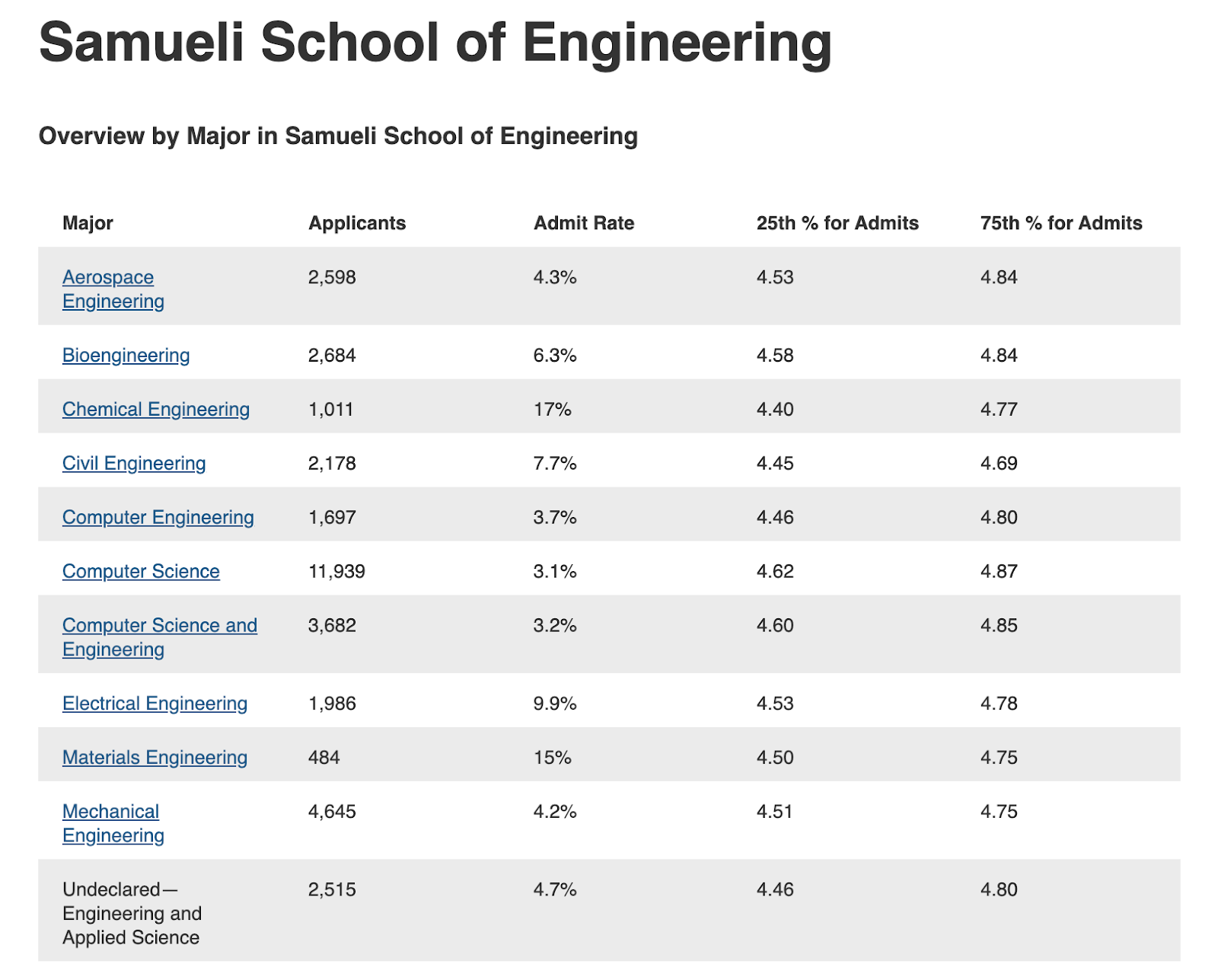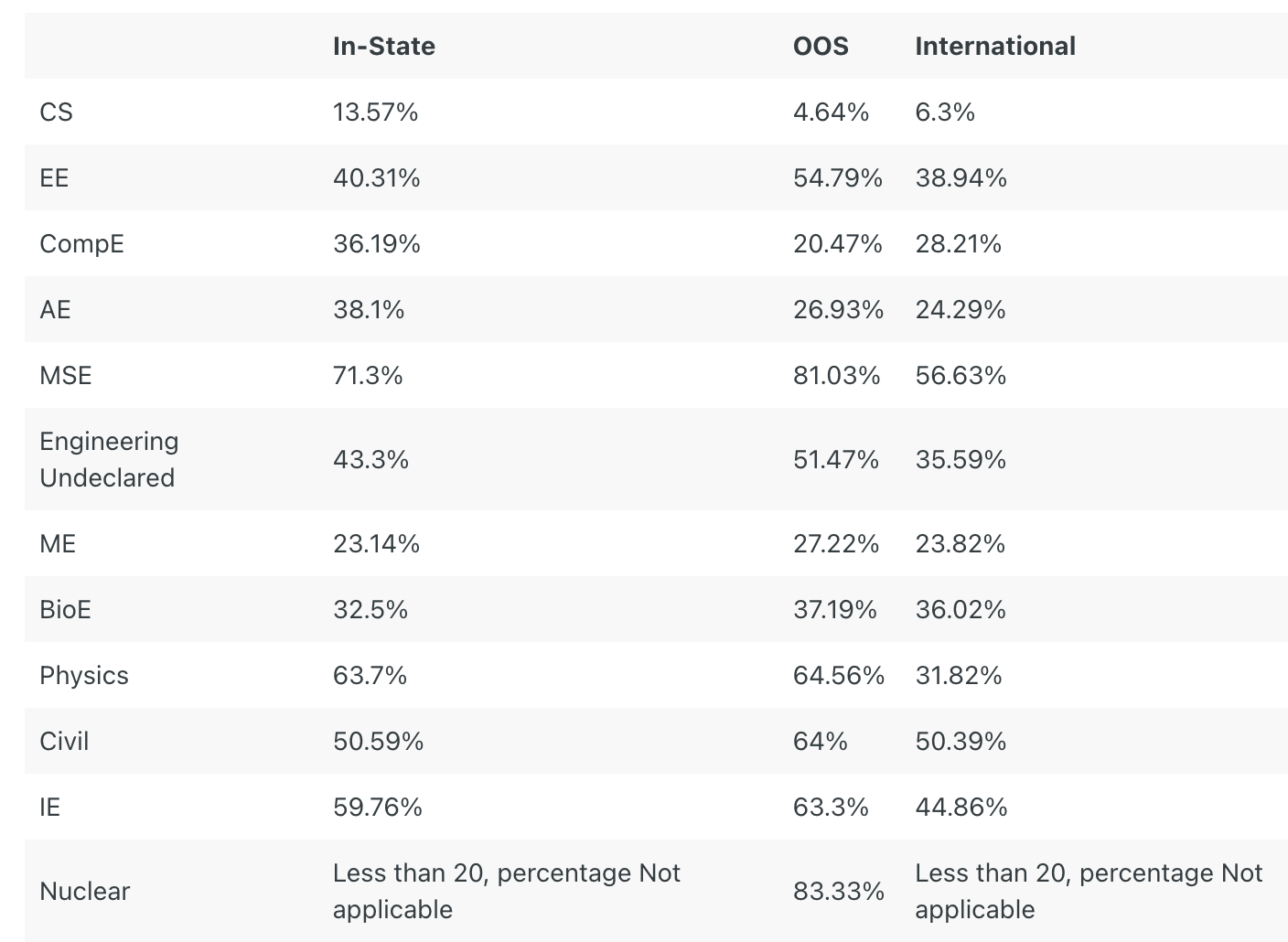One question that often comes up in discussions with students and parents is: “Does the major I choose affect my chances of admission?”
Some sources claim that the major you apply to has no bearing on your chances of acceptance, highlighting that most universities admit students to the institution first, and that admissions officers know it’s common for students to change majors during undergrad.
However, that doesn’t tell the whole story. According to public data and our counselors’ experiences, applying to certain majors can increase or decrease your chances of admission for the following reasons:
- Acceptance rates vary across subject-specific schools (e.g., the College of Engineering vs. the College of Arts and Sciences) and individual majors within these subject-specific schools (e.g., mechanical engineering vs. civil engineering).
- All academic departments face practical limitations on resources, meaning popular majors can be capped or “impacted.”
- Some majors align better with your personal narrative and can strengthen your application for admissions review.
Of course, if you’re already crystal clear about your dream major, then go for it, regardless of how competitive the numbers may be. But if you are one of the many students who are on the fence about what to study or only have a general sense about your academic interests, it may be helpful to weigh your options in the context of this article.
1. Varying Acceptance Rates Across Subject-Specific Schools Within a College/University
Some schools like Brown, Amherst, and Yale admit students to the institution as a whole, meaning your major plays a much smaller role in the admissions decision. But, at many larger colleges and universities, students are admitted to a specific school (e.g., the College of Arts and Sciences, the College of Engineering, the College of Business, the College of Nursing).
Acceptance rates between these subject-specific schools can vary widely, but typically, the engineering, business, and nursing colleges are the most competitive.
The University of Illinois Urbana-Champaign’s 2024 admit rates, found on their official website, confirm this:
- College of Agricultural, Consumer & Environmental Sciences: 56.7%
- College of Applied Health Sciences: 34.1%
- College of Education: 46.1%
- College of Fine & Applied Arts: 49.5%
- College of Liberal Arts & Sciences: 41.5%
- College of Media: 37.9%
- Division of Exploratory Studies: 53.6%
- Gies College of Business: 23.1%
- Grainger College of Engineering: 24.2%
- School of Information Sciences: 55.2%
- School of Social Work: 50.9%
Other schools, like Cornell University, echo that trend, with the Engineering and Business schools showing the lowest acceptance rates: https://irp.cornell.edu/university-factbook/undergraduate-admissions (2024 data)
- College of Agriculture and Life Sciences: 14.70%
- College of Architecture, Art, & Planning: 9.04%
- College of Arts & Sciences: 7.38%
- Brooks School of Public Policy: 10.24%
- Dyson School of Applied Economics and Management: 4.94%
- College of Engineering: 6.73%
- Nolan School of Hotel Administration: 17.97%
- College of Human Ecology: 11.98%
- College of Industrial & Labor Relations: 20.45%
Thus, the major you select can statistically increase or decrease your chances of admission to colleges that admit to subject-specific schools.
2. Varying Acceptance Rates Across Majors
Even within subject-specific schools at a university, acceptance rates—and the average GPA of admitted students in those majors—vary widely.
Note the considerable differences in acceptance rates across different engineering majors at the University of California, Los Angeles and the University of Illinois Urbana-Champaign: https://admission.ucla.edu/apply/first-year/first-year-profile/2023/major (Fall 2023 data)

Similarly, here is data from UIUC’s Grainger College of Engineering, pulled from a 2022 Freedom of Information Act request submitted by a student:

At both schools, the trend holds: Computer Science and Mechanical Engineering have lower acceptance rates, whereas Civil Engineering and Materials Science and Engineering have higher acceptance rates. Of course, this could be due to fewer students applying to those more niche majors, but that would only confirm the point: a student applying to a less popular major may have a higher chance of admission. If the applicant pool is smaller, it will likely be less competitive.
A third chart from the University of California, Berkeley confirms this: https://www.universityofcalifornia.edu/about-us/information-center/freshman-admission-discipline (2023 data)
Again, Engineering and Computer Science tend to be the most competitive, both in terms of GPA and acceptance rates. Note, however, the higher acceptance rates and slightly lower GPAs for majors housed in the arts and humanities and physical sciences/math.

Therefore, if a student is equally interested in Applied Math and Computer Science, could selecting the former increase their odds of admission to a specific university? The data suggests yes.
3. Limitations of Resources and Impacted/Capped Majors
Practically speaking, each department at a university has limited resources: a certain number of professors, classrooms, laboratories, etc. Because departments can only absorb a specific number of students, universities often cap admissions to extremely popular or “impacted” majors. A major is “impacted” when the number of applications received from fully qualified applicants exceeds the number of available spaces.
Even if a school claims they don’t consider major selection during application review, if 10,000 students suddenly chose Horticulture as their first-choice major, the acceptance rate for that major would drop significantly, as the college would be forced to turn away qualified applicants to avoid an administrative disaster.
Therefore, getting accepted to capped or impacted majors will always be more challenging than getting accepted to less popular majors looking to fill seats rather than turn students away.
Here is some public data on capped majors at California schools:
UC San Diego Impacted Majors: https://students.ucsd.edu/academics/advising/majors-minors/selective.html (2025)
- Data Science
- Public Health
- Bioengineering
- Chemical Engineering
- Computer Science and Engineering
- Electrical and Computer Engineering
- Mechanical and Aerospace Engineering
UC Santa Barbara Impacted Majors: https://admissions.sa.ucsb.edu/faq (2025)
“Majors in UCSB's College of Engineering are selective, meaning they have a limited number of spaces available.”
UC Santa Cruz Impacted Majors: https://engineering.ucsc.edu/besa/faq/ (2025)
“The UC Santa Cruz computer science major is currently impacted.”
Cal State Impacted Majors: https://www.calstate.edu/attend/impaction-at-the-csu/Documents/ImpactedProgramsMatrix.pdf (2025-2026)
Majors with the highest rates of impaction:
- Engineering
- Biological Sciences
- Nursing
- Computer Science
The higher impaction rates in majors like Engineering, Computer Science, and Nursing align with the low acceptance rates and competitive GPAs we saw earlier. Can applying to an impacted major affect a student’s chance of admission? The data suggests yes.
4. Majors Aligned with Your Personal Narrative Can Increase Chances of Admission
Beyond acceptance rates, GPA ranges, and rates of impaction, selecting a major that aligns with your academic and extracurricular explorations in high school can increase your chances of admission. Demonstrating a clear interest in a particular subject and taking relevant courses for that major can prove to admissions officers that you are genuinely drawn to the field you’re applying to. It will also show that you are prepared for the major’s required courses.
Conversely, selecting a major that does not align with your academic and extracurricular explorations in high school can concern admissions officers about your preparedness for the major or whether your interest is genuine. If you spent your high school researching South American poets but chose Data Science as your first-choice major, it could be difficult to write essays explaining why you want to major in data science (especially if you have no exposure to the subject). Similarly, if you selected Applied Math as your first-choice major but only took AP courses in the humanities, admissions officers might question your readiness to handle the upper-division coursework for that degree.
Conclusion:
The key takeaway from all of this is that yes, statistically speaking, some majors and subject-specific programs are more competitive than others. However, that shouldn’t deter you from applying to the major you want. Nor should it encourage you to choose a major that has nothing to do with your interests simply because the statistics say the odds of admission are higher.
Ultimately, you should apply to the major most aligned with your high school curriculum, the academic subjects you find the most interesting, and the future you want to create for yourself. But if you are unclear about any of these things, consider, at the very least, the subjects you did well in and enjoyed during high school, while trying to avoid highly competitive majors where students have a lower chance of acceptance. Remember: college is an opportunity to explore and find your true path, but you have to get accepted first.




.jpg)




